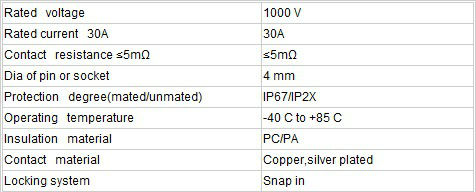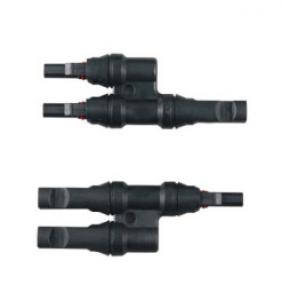Solar cable Connector ST01 S B
- Loading Port:
- China Main Port
- Payment Terms:
- TT OR LC
- Min Order Qty:
- -
- Supply Capability:
- 10000 set/month
OKorder Service Pledge
Quality Product, Order Online Tracking, Timely Delivery
OKorder Financial Service
Credit Rating, Credit Services, Credit Purchasing
You Might Also Like

- Q:Can solar energy systems be used in areas prone to hurricanes or earthquakes?
- Yes, solar energy systems can be used in areas prone to hurricanes or earthquakes. While these natural disasters can cause significant damage, solar energy systems are designed to withstand harsh weather conditions. Solar panels are built to be durable and are tested to meet stringent standards for wind and impact resistance. Additionally, solar energy systems do not have any moving parts, which reduces the risk of damage. However, it is important to ensure proper installation and maintenance of solar systems to enhance their resilience in disaster-prone areas.
- Q:Can solar energy systems be used for powering medical equipment in remote areas?
- Yes, solar energy systems can be used for powering medical equipment in remote areas. Solar power is a reliable and sustainable source of energy that can be harnessed to generate electricity for operating medical equipment even in areas with limited or no access to the electrical grid. This is particularly crucial in remote areas where infrastructure and power supply may be inadequate. Solar energy systems can provide a cost-effective and environmentally friendly solution, ensuring that essential medical equipment is powered and healthcare services can be delivered effectively.
- Q:How does a solar thermal system convert sunlight into heat?
- A solar thermal system converts sunlight into heat by absorbing the sun's energy through solar collectors, typically made of glass or metal. These collectors contain a fluid, such as water or antifreeze, which is heated by the absorbed sunlight. The heated fluid is then circulated through pipes or tubes to transfer the heat to a storage tank or directly to a building's heating system. This process allows the sunlight to be converted into usable heat energy for various applications, such as heating water or spaces.
- Q:Can solar energy systems be used in residential buildings?
- Yes, solar energy systems can be used in residential buildings. In fact, they are increasingly popular as a sustainable and cost-effective alternative to traditional energy sources. These systems can generate electricity to power the household, heat water, and provide heating or cooling, reducing dependence on fossil fuels and lowering utility bills. Additionally, government incentives and the declining cost of solar technology have made it more accessible for homeowners to install solar panels on their roofs.
- Q:Can solar energy systems be used in areas with high rainfall?
- Yes, solar energy systems can be used in areas with high rainfall. While excessive cloud cover and rain may reduce the efficiency of solar panels, they can still generate electricity even in such conditions. In fact, some solar panels are designed to work optimally in diffused light, making them suitable for areas with frequent rainfall. Additionally, advancements in solar technology and battery storage systems have made it possible to store excess energy during sunny periods for use during rainy days, ensuring a continuous power supply.
- Q:Can solar energy systems be used during a power outage?
- Yes, solar energy systems can be used during a power outage. However, this is only possible if the solar energy system is equipped with battery storage. Without battery storage, the solar panels will not be able to generate electricity during a power outage as they rely on grid connection to function.
- Q:Can solar energy systems be used for powering recycling facilities?
- Yes, solar energy systems can be used to power recycling facilities. Solar panels can generate electricity from the sun's energy, which can then be used to power the various operations and machinery involved in recycling processes. This renewable energy source helps reduce carbon emissions and makes recycling facilities more sustainable and environmentally friendly.
- Q:Can solar energy systems be used in areas with limited access to technical expertise?
- Yes, solar energy systems can be used in areas with limited access to technical expertise. Solar technology has become increasingly user-friendly and accessible over the years. There are now simple and modular solar energy systems available that require minimal technical knowledge to install and maintain. Additionally, organizations and initiatives focused on renewable energy are often providing training and support to communities with limited technical expertise, enabling them to adopt and benefit from solar energy systems.
- Q:Can solar energy systems be used in powering recycling plants or waste management facilities?
- Certainly, recycling plants and waste management facilities can make great use of solar energy systems. These systems harness the sun's power to produce electricity, which can then be utilized to operate various equipment and machinery within these facilities. It is worth noting that these facilities require a significant amount of energy to power their operations, including machines for sorting and processing, conveyor belts, and other equipment. By installing solar panels on the roofs or in close proximity to these facilities, they can generate clean and renewable electricity, thus reducing their dependence on conventional energy sources. Solar energy systems offer numerous advantages for recycling plants and waste management facilities. Firstly, they provide a reliable and consistent source of energy, as the sun is readily available in most regions throughout the year. In contrast to fossil fuels or other non-renewable sources, solar energy systems do not deplete natural resources or contribute to greenhouse gas emissions, making them environmentally friendly. This aligns perfectly with the sustainability goals of recycling plants and waste management facilities, which aim to minimize the environmental impact of waste management processes. Moreover, solar energy systems can help these facilities save on energy costs. Once the initial investment in solar panels is made, the ongoing operational expenses are relatively low. Additionally, certain regions offer incentives and financial support for the installation of solar energy systems, further offsetting the initial investment and making it financially attractive. Furthermore, recycling plants and waste management facilities often possess ample surface areas suitable for solar panel installations, such as rooftops or open fields. This facilitates the installation of a sufficient number of solar panels to meet the energy demands of these facilities. In some cases, surplus energy generated by the solar panels can even be fed back into the electrical grid, enabling the facilities to generate revenue from the excess electricity. In conclusion, solar energy systems can effectively power recycling plants and waste management facilities. They present a sustainable and cost-effective solution, reducing dependence on traditional energy sources while aiding these facilities in achieving their environmental objectives.
- Q:Can solar energy systems be used for commercial buildings?
- Yes, solar energy systems can certainly be used for commercial buildings. In fact, many businesses are increasingly adopting solar energy systems to power their operations due to the numerous benefits they offer. These systems can help reduce energy costs, improve energy efficiency, and contribute to a cleaner and more sustainable environment. Additionally, with advancements in solar technology, it is now possible to install solar panels on various types of commercial buildings, including offices, warehouses, manufacturing facilities, and shopping centers.
1. Manufacturer Overview |
|
|---|---|
| Location | |
| Year Established | |
| Annual Output Value | |
| Main Markets | |
| Company Certifications | |
2. Manufacturer Certificates |
|
|---|---|
| a) Certification Name | |
| Range | |
| Reference | |
| Validity Period | |
3. Manufacturer Capability |
|
|---|---|
| a)Trade Capacity | |
| Nearest Port | |
| Export Percentage | |
| No.of Employees in Trade Department | |
| Language Spoken: | |
| b)Factory Information | |
| Factory Size: | |
| No. of Production Lines | |
| Contract Manufacturing | |
| Product Price Range | |
Send your message to us
Solar cable Connector ST01 S B
- Loading Port:
- China Main Port
- Payment Terms:
- TT OR LC
- Min Order Qty:
- -
- Supply Capability:
- 10000 set/month
OKorder Service Pledge
Quality Product, Order Online Tracking, Timely Delivery
OKorder Financial Service
Credit Rating, Credit Services, Credit Purchasing
Similar products
New products
Hot products
Related keywords



























